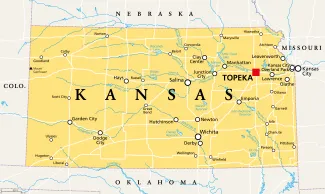
Kansas audit: Counties not fully compensated for delivering state-mandated services
The Kansas Legislature’s auditors reported that Johnson, Labette and Gove counties spent $28.8 million to provide three state-mandated government services last year, but received one-third of that total in state, federal or user-fee funding to cover those administrative costs.
The three counties were selected for the audit because they represented a range of populations, geographic locations and spending per capita among Kansas’ 105 counties. Under state law, auditors said, Kansas counties provided 18 distinct core services. The limited audit examined costs during the 2024 fiscal year for the three counties in terms of services for criminal prosecution, motor vehicle registration and the collection of ad valorem taxes.

© PeterHermesFurian - iStock-1352430281
“The state requires counties to perform a lot of different services,” said Andy Brienzo, the supervising auditor who presented the report Monday to the Joint Legislative Post Audit Committee.
He said auditors estimated it would cost the state $19.1 million to compensate the three counties for compliance with minimum levels of service outlined in state law for the three areas reviewed.
The analysis was requested by Representative Shannon Francis, a Republican from Liberal who chairs the audit committee, and Representative Adam Smith, a Weskan Republican who chairs the House Appropriations Committee.
“I’ve always struggled with this,” Francis said. “I understand that the state does need to step up in this area.”
The Kansas Association of Counties estimated more than half of counties’ annual spending relates to providing services required by state law.
Johnson County had 632,000 residents in 2024, while Labette County in southeast Kansas contained 19,600 people, and Gove County had 2,600 residents.
Outdated model
Thomas Franzen, treasurer in Johnson County, said the majority of revenue collected by county treasurers in Kansas was passed to the state government. The audit, he said, revealed differences among Kansas counties in terms of administrative costs and levels of services provided. This reality was most evident in the administration of motor vehicle services, he said.
“Labor is the largest cost component to providing the services, and labor markets are different across the state,” Franzen said. “These differences lead to significantly different cost structures across 105 counties providing these services.”

© zimmytws - iStock-511889079
He said Kansas’ standard county service fee structure made sense when the Kansas Department of Revenue performed a significant portion of administrative work tied to motor vehicle services. The fixed-fee structure has been flawed since 2012, when many of these responsibilities were transferred to county treasurers, he said.
“We’ve got a model that is very outdated. It’s a one-size-fits-all model,” Franzen said. “Standardized fee structures to fund these services don’t make sense in today’s world. A fee structure that allows local governments to charge fees necessary to provide the desired level of customer service is what is needed now.”
However, Representative Shawn Tarwater, R-Stilwell, said Johnson County collected enough in property taxes annually to “more than make up” for costs incurred by the county to provide core government services outlined by the state.
In the audit report, auditors said Johnson County officials concluded the state’s requirement that motor vehicle titling be done in person was an administrative burden. Implementation of electronic titling in Kansas, as some states have done, would raised in the audit as an option for reducing staffing requirements, the counties told auditors.
Officials in the three audited counties said they disliked the state’s MOVRS computer system for registering motor vehicles. The report said the system was “slow and unreliable,” especially at the end of each month, “when the volume of activity spikes and the system is prone to crashes.”
‘Huge burden’
Steven Hirsch, who serves as Gove County attorney, said the western Kansas county could benefit from a surcharge on traffic tickets to handle costs incurred while enforcing state traffic law. He said the county’s administrative cost for criminal prosecutions was unusually high because 30 miles of Interstate 70 passed through Gove County. Without I-70, he said, Gove County might expect 250 traffic cases per year.
“Gove County handles 1,400 traffic cases,” Hirsch said. “This puts a huge burden on us as prosecutors and upon the courts.”
He said a majority of the offenders weren’t residents of Gove County. Small-population counties with long segments of interstate highway could benefit from state approval of a surcharge on traffic tickets to finance prosecution costs, he said.
In Johnson, Labette and Gove counties, auditors estimated the three spent $17.3 million on state-mandated criminal prosecutions in fiscal year 2024. The costs were offset by $846,000 in grants and user fees, the audit said.
Motor vehicle registration services in the three counties last year reached $8.3 million, and expenditures required by the state were partially offset with $5 million in user fees. The three counties devoted $3.2 million to collecting ad valorem taxes in 2024, but that was fully offset by $3.9 million in user fees and fines.
The three areas studied by auditors were chosen from among 18 core services provided by county governments in Kansas. Areas not considered in the audit included election administration, emergency management, jail operations, public health and property evaluation.
Senator Caryn Tyson, a Parker Republican, said she objected to repeated references to “state-mandated” services.
“I know that terminology is bantered around,” Tyson said. “Don’t the counties exist because of state statute? It kind of makes sense that we would oversee some of the functions of those counties.”

















